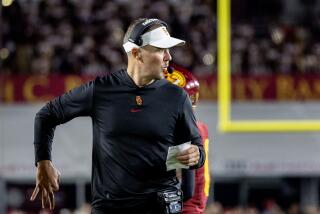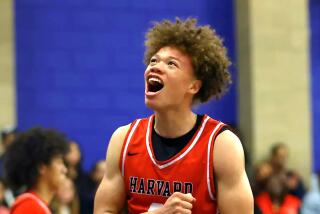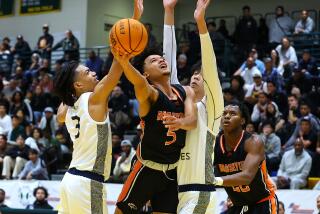A DRIVE TO SUCCEED
TUCSON, Ariz. — Damon Stoudamire, Mike Bibby, Jason Terry.
At Arizona, the point guards just keep coming.
But for Terry, it’s different. While he might be the best college point guard in the country, he had to settle for being the Wildcats’ sixth man before he finally got a chance as a senior.
“I think it will be a great lesson for us to be able to use with other people,” coach Lute Olson said. “Persistence will pay off in the end, and being a team player pays off.”
Since his early teens, as he watched his mom work long hours as a bus driver to make ends meet for 10 children, Terry vowed to someday buy her a dream home on Seattle’s Lake Washington.
With his NBA stock rising, her big moving day is only a few spin moves, 3-point jumpers and slick no-look passes away.
Terry is the Pac-10 leader in scoring (22 points), assists (5.6) and free throw percentage (.865). He has virtually willed the Wildcats--a team with five freshmen in the regular rotation--into a top 10 ranking.
“He has really developed into such a great player,” said Tennessee coach Jerry Green, who coached at Oregon until this season. “He does it all. He can score. He can drive. He defends. He is a complete player.”
When the Wildcats are going well, Terry tries to get everyone involved. But when things are tough, he relies on the player he trusts the most--himself.
“It’s just because I hate to lose,” he said. “My will to win is so strong that when it gets down to it, I’d rather do the job myself.”
He would like to be the next Gary Payton.
“That’s the guy I look up to and try to follow in his footsteps,” Terry said. “After that, somebody will just try to be the next Jason Terry.”
It’s a boast he can back up.
With cat-quickness, almost always in control, Terry can dominate a game for long, crucial stretches.
Before he turned the team over to Terry this year, Olson was concerned about ball-handling. Terry still will make mistakes, but he’s just as likely to come back with a critical steal or big basket.
“He knows when to break and when to pull up,” California coach Ben Braun said.
“You don’t see him force a shot very often. He does so many little things. There is a sense of calm around him. There is never a sense of desperation. He’s a clinic for other players to watch.”
Much of Terry’s life is outlined on the tattoos on his biceps and chest.
There’s the prefix 206, the area code for Seattle, where he grew up. There’s a heart with the name of his 1 1/2-year-old daughter Jasionna, and the cartoon character “Underdog” dunking a basketball “because I’ve always felt like the underdog.”
There’s the word “captain” and his No. 31.
“Right below that there’s 211,” he said. “That stands for armed robbery, because I’m the school record holder in steals.”
And there’s a cross with the name “Caleb,” his brother who drowned at age 4 at a family picnic, when Terry was 14.
Terry had only been playing basketball for about a year at that time. His mother had made him quit football after one season, even though that sport was and remains his first love.
“He tells me I deprived him of being a football star,” his mother, Andrea Cheatham, said. “He never lets me forget that.”
To understand why Terry seems so unfailingly upbeat, one has to look no farther than his mother.
“You hardly ever see Jason when he’s not smiling and happy,” Olson said. “Anyone who knows his mom knows exactly where that comes from.”
Cheatham, on medical leave from her job as a Seattle bus driver, has moved with her four youngest children to Tucson.
Cheatham’s life has known no calm. Her children range in age from four to 25. The five-bedroom house where the family lived in Seattle was always crowded, not just with her children but with stepchildren, friends and foster children.
When Jason left for college, 13 people were living there.
“She’s meant a lot,” he said, “just to see how strong she was raising 10 kids by herself. When I’m trying to get motivated, I think of how hard she worked. I’d love to give back to her.”
When he arrived at Arizona, Terry played behind Reggie Geary and Miles Simon. Then Bibby arrived and Terry was the sixth man, both on the 1997 national championship team and last year’s 30-5 squad that lost to Utah in the West Regional finals. While he didn’t start, but often was in the game at the end.
“Jason is first and foremost a winner, and he knew how important he was to us as a player,” Olson said. “His sophomore and junior years, we wouldn’t have been anywhere near where we were without Jason Terry.”
Shooting was not Terry’s strength. But he kept working at it, especially last summer, when he was about to become the starting point guard. He won’t leave the court until he makes 600 shots.
“At first, it was tough, just because I wasn’t making a lot of shots. Now I can get it done in about 45 minutes.”
It’s the kind of effort that Terry believes will make him a good pro.
“I worked so hard to get to this point, and now that it’s here, I’m not satisfied,” he said. “I’m never satisfied. I think my strongest assets are my will to win, my leadership ability and my defense.”
Terry has been telling his mother since he was in junior high that he’d be a rich sports star and would buy her that big house. It seemed so far away then, and seems so close now.
“When we’re in the car together, sometimes we look at each other and say ‘Can you believe this?” his mother said. “He always says ‘I don’t even want to think about it, because I’ll just wake up and it will all be a dream.”
More to Read
Go beyond the scoreboard
Get the latest on L.A.'s teams in the daily Sports Report newsletter.
You may occasionally receive promotional content from the Los Angeles Times.










